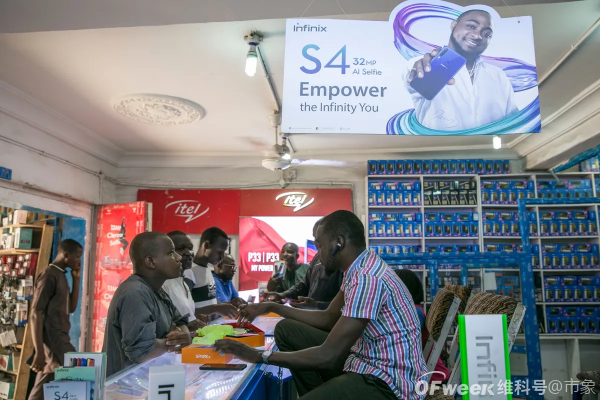The hidden champion of the African mobile phone market: how China's Transsion conquers the African continent
![]() 09/20 2024
09/20 2024
![]() 473
473

In Shenzhen, China, Transsion Holdings has been meticulously crafting mobile phone products tailored to the tastes of African consumers for many years.
On the bustling streets of Lagos, Nigeria, amidst the hustle and bustle of minibuses and electric tricycles, the exterior walls of a bustling electronics market are covered with advertisements for the latest tech products. A giant billboard towers overhead, showcasing Tecno Mobile Ltd.'s Camon series of smartphones, equipped with AI imaging technology.
Inside the glass display cases lining the sidewalk, shelves are stacked with Infinix Mobility Ltd. and Itel Mobile Ltd. smartphones priced below $150. A wide banner advertises Oraimo SpacePods earbuds, recommended by African pop superstar Burna Boy.
While these brands may be unfamiliar to most Europeans and Americans, they are household names in Africa. They all belong to the same company: Chinese manufacturer Shenzhen Transsion Holdings.
Since 2006, Transsion has been promoting its Tecno phones in Africa. Two years later, with the advent of the iPhone, Transsion decided to focus solely on the Sub-Saharan African market, initially with feature phones—low-cost devices with limited capabilities and relatively thin margins. Canalys' mobile analyst Manish Pravinkumar sees this as a bet that African consumers would eventually embrace more advanced electronics.
In the first quarter of 2024, Transsion surprised industry observers by leaping to fourth place in global smartphone market share rankings, with shipments growing 85% year-over-year. Although Transsion's ranking subsequently slipped to sixth, its long-term strategy is starting to bear fruit.
Transsion has consistently focused on catering to African consumers' usage habits. Over the years, the company has developed multi-SIM slot phones, as African users frequently switch telecom operators in search of better service. Transsion has also equipped its devices with camera sensors that better capture darker skin tones and robust audio modules to meet the local demand for using phones as music players. Company founder Zhu Zhaojiang once told the Global Times, "Only when companies truly respect the local culture and traditions of a market can they gain a foothold there."
Zhu Zhaojiang has focused on reducing supply chain costs to ensure profitability even for the company's cheapest products. An anonymous Transsion executive revealed that some of the company's phones in the 2010s sold for less than $20.
Transsion segments its product line into three brands, initially sold exclusively in Africa, giving these Chinese-made products a more local feel. Itel offers entry-level devices, while Tecno and Infinix provide higher-end smartphones priced around a few hundred dollars. Pravinkumar notes that retailers clamor to sell Transsion products. "If you don't have Tecno phones in your store, you're behind the times," he says.
Today, Transsion holds roughly half of the African smartphone market and an even larger share of the feature phone market. The company has also found success in parts of Asia and the Middle East, with a significant portion of its revenue coming from outside Africa, highlighting the global potential of the Transsion model. In India, for example, its affordable 5G phones are gaining popularity, and the company has invested heavily in local manufacturing and marketing. Additionally, Transsion has launched Boomplay, a Spotify-like music service with over 90 million monthly active users globally, along with news and payment apps.
In June of this year, IDC reported that smartphone shipments in Africa surpassed feature phone shipments for the first time earlier in the year. This shift presents new opportunities for Transsion but also means facing intense competition from Xiaomi, Samsung, Oppo, and even Apple. A Transsion executive notes that maintaining its market position amidst the influx of international brands into Africa will be a significant challenge. "As people's living standards improve, their demands for technology and phone quality are also rising," the executive says. "Some people would rather buy a used iPhone than a new Tecno phone."








